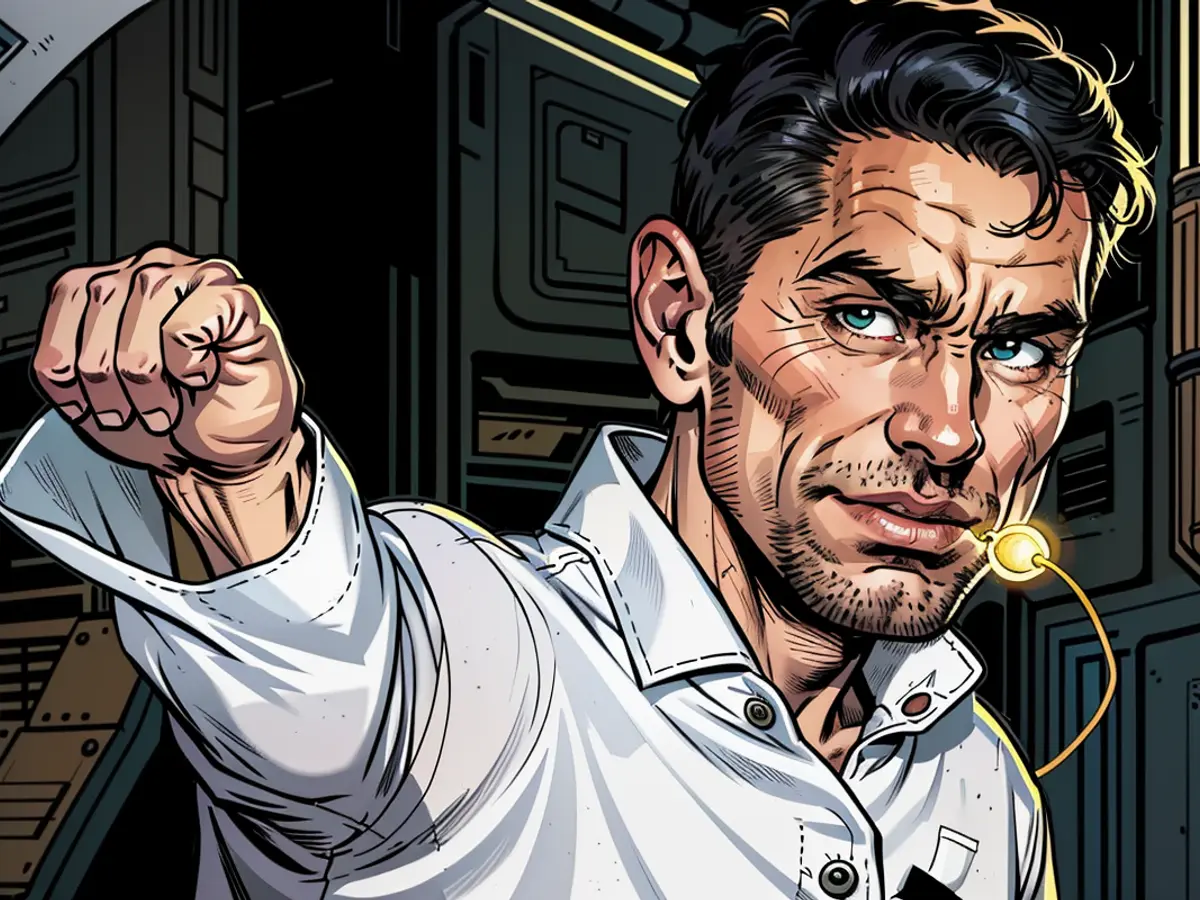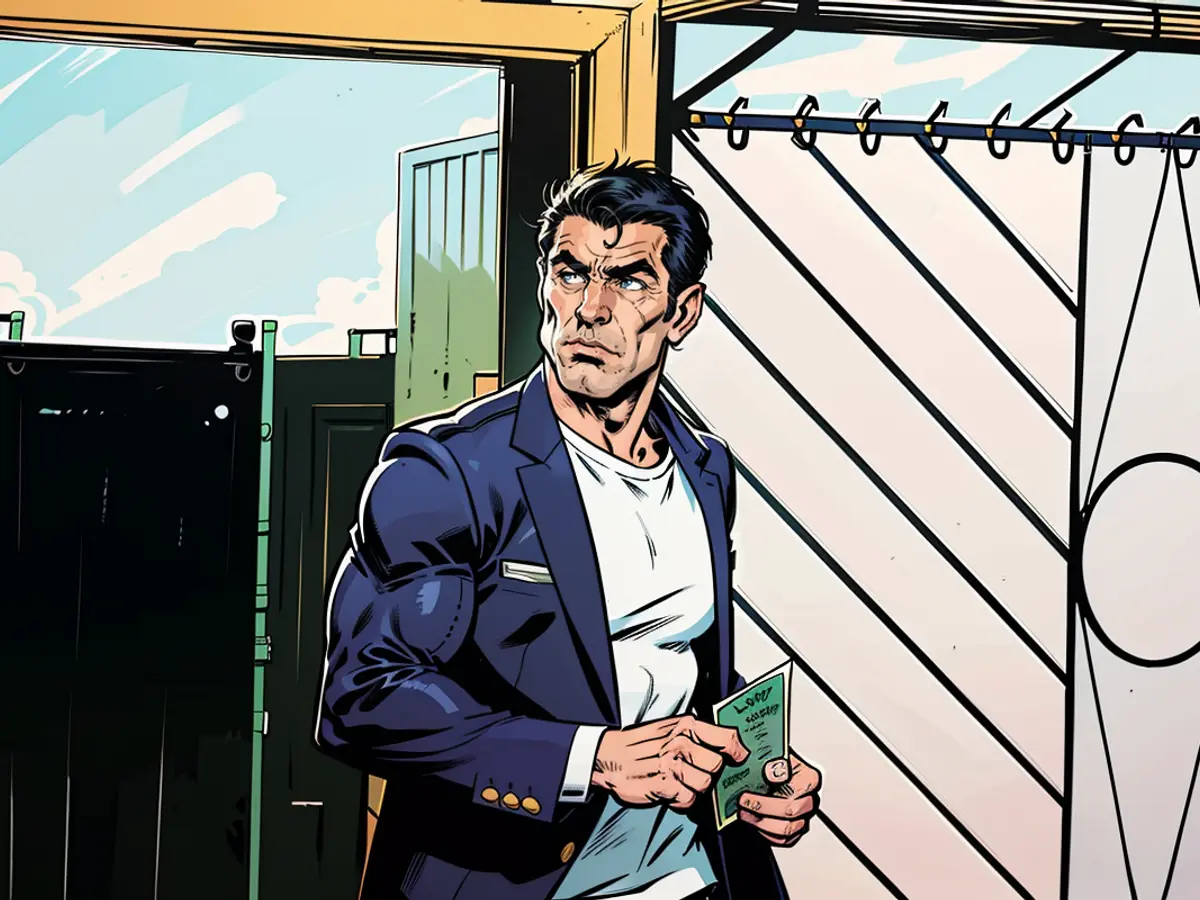Initial findings indicate: AfD victories in Thuringia, likely CDU requires dialogues with leftists, Greens, and FDP outside the party.
In Thuringia, the Alternative for Germany (AfD) has clinched the most votes in a German state election for the first time. Led by top candidate Björn Höcke, the party managed a commanding 32.8% in the final tally. Regrettably, due to reluctance from all democratic parties, the AfD won't be able to form a government. The Christian Democratic Union (CDU), the second strongest force, is anticipated to seek the support of the Left for a stable coalition government, with one seat short of a majority when joined by the Social Democratic Party (SPD) and the Free Democratic Party (BSW).
At 23:03, the Left secured direct mandates in Saxony, allowing them to enter the parliament, even though they fell short of the 5% threshold based on predictions. As a result, the ruling coalition of the CDU, the Greens, and the SPD no longer has a majority.
Green Party leader Omid Nouripour attributes the outcomes of the state elections in Saxony and Thuringia predominantly to issues of migration and the situation in Ukraine. "Clearly, migration and the question of peace in Ukraine played a significant role as the election approached," Nouripour stated to Phoenix TV. While the federal government is tackling these issues, "we're paying a price because this coalition delivers, yet undermines itself with unnecessary disputes."
The coalition in Thuringia under Minister President Ramelow has come to an end, with the most likely candidate for a government coalition being an unprecedented alliance of the CDU, the Left, and the SPD. As of 22:15, according to current projections, this grouping is one seat short of a majority in the state parliament, making it reliant on the Left's support.
CDU top candidate Mario Voigt missed the direct mandate in his constituency in Thuringia. With 37.4% of the first votes in the Saale-Holzland district II, Voigt finished behind the AfD candidate Wiebke Muhsal, who received 39.2%. In the 2019 state election, Voigt managed to be directly elected to the state parliament.
More than a third of young voters in Thuringia cast their ballots for the AfD, a party classified as right-wing extremist by the domestic intelligence agency. According to a survey conducted by infratest-dimap for ARD, 38% of 18- to 24-year-olds in Thuringia voted for the AfD. The Left and the CDU had the second and third-placed votes, with 16% and 13%, respectively. The Greens suffered the worst performance among young voters, with only 6% of votes in their favor.
Saxony's Minister President Michael Kretschmer secured the direct mandate in his constituency of Görlitz II, with 47.2% of the votes, a clear lead over the AfD candidate, who received 39.4%. Interestingly, Kretschmer's party performed worse in his constituency, obtaining just 34.2% of the votes, while the AfD garnered 37.3%.
The current projections for Saxony from ARD and ZDF indicate the CDU clearly leading over the AfD. According to both Infratest Dimap (ARD) and the Research Group Wahlen (ZDF), the CDU has a slim lead of approximately 1% over the AfD, with 31.5-31.8% contrasted with the AfD's 30.4-30.8%. Initially, the Research Group Wahlen had shown a close race between the CDU and the AfD, with the AfD threatening to overtake the CDU's narrow advantage. However, the ARD projection consistently indicated the CDU's considerable lead.

Ramelow's "heart's desire" for the evening—that the AfD would not receive no less than a third of all votes—seems highly unlikely to materialize, which could result in a blocking majority for decisions requiring a two-thirds majority.
Despite the poor results in the Thuringia and Saxony state elections, federal Chancellor Olaf Scholz can continue to count on the support of his party, the SPD, according to SPD chairman Lars Klingbeil. In an interview with ZDF, Klingbeil stated, "And I, as the federal chairman of the party, expect everyone to now work even harder than they have been." The party must collectively fight to regain votes, Klingbeil conveyed.
21:02 FDP Deputy Chair Kubicki: "Traffic Light Coalition Has Lost Its Mandate"After the underwhelming performance of the traffic light parties in the Saxony and Thuringia elections, FDP's deputy chair, Wolfgang Kubicki, has suggested consequences for the national coalition. "The election results demonstrate: the traffic light coalition has lost its mandate," Kubicki wrote on "X". If a substantial portion of voters reject the coalition in this manner, it must result in consequences. The public perception is that "this coalition is damaging the country," Kubicki mentioned. The FDP failed to clear the 5% threshold in both state elections and is currently projected to be at a mere 1%.
20:37 Saxony: The Left Party Appears Likely to Gain Parliamentary Seats Despite a 4% DropIn spite of significant losses, the Left Party is on track to enter the Saxony state parliament. Despite falling short of the 5% threshold with second votes, they're projected at 4.3% by ZDF's most recent estimate. However, two Left Party direct candidates in Leipzig districts boast substantial leads over their competitors. Securing two direct mandates could guarantee the Left Party a few seats in the new state parliament. These potential winners could also secure the top positions on their party's state list, potentially denying the current coalition of CDU, SPD, and Greens a majority. Minister-President Kretschmer would then need the BSW for a governing majority.
20:28 Projected Winner for Thuringia: AfD's Vote Share Keeps GrowingAccording to ZDF's latest Thuringia election results projection, the AfD's vote share is rising further, reaching 33.4%. The CDU stands at 23.8%, the SWB at 15.5%, the Left Party at 11.9%, the SPD at 6.0%, and the Greens at 3.4%. FDP fails to surpass 1.2%.
20:17 Projected Winner for Saxony: CDU's Lead Over AfD has NarrowedAs per ZDF's latest Saxony election results projection, the CDU in Saxony has only a 0.1 percentage point lead over the AfD. The Christian Democrats stand at 31.5%, with the right-wing extremist AfD close behind at 31.4%. In Thuringia, the AfD has outpaced the CDU significantly, according to projections. The Greens in Saxony are currently at 5.1% and face uncertainty regarding their parliamentary seats. The Left Party, with a projected 4.3%, has little chance of entering the parliament. The SPD, at 7.6%, is secure in the state parliament.
19:56 Thuringia: Höcke's Direct Parliamentary Seat UncertainAfD's faction leader Björn Höcke's direct entry into the Thuringia state parliament is uncertain. With 68 of 74 electoral districts counted, CDU's Christian Tischner holds a 42.3% vote lead over Höcke's 40.4%. If Tischner wins a majority in the Greiz II electoral district, Höcke will not secure a direct mandate and will rely on a seat via the state list, where he's first in line. However, if many AfD direct candidates are successful, no one else from the party will enter the parliament via the state list.

19:50 Höcke on AfD's Success: "The Firewall Approach Has Failed"In Thuringia, the AfD is poised to enter the state parliament as the top force. "The firewall approach has failed," concludes AfD's top candidate Björn Höcke. In an interview with ntv, he classifies the election result as "historic" and discusses the upcoming government formation.
19:42 Ramelow on Left Party's Decline: "We've Been Cannibalized"Thuringia's Minister President Bodo Ramelow attributes the "cannibalization" of his Left Party to two causes: "First, a CDU that has constantly equated the AfD and the Left, has always pushed 'exclusionism' in our direction, despite factually shaping the land with us for five years," said the head of government on ntv. As another factor for the Left's decline, Ramelow named "a BSW that announced it would win 17% of the votes for the AfD, and in reality, they have now taken our votes." However, Ramelow could still rejoice in the high voter turnout.
19:26 Nouripour on AfD's Success: "My Thoughts are with Those who are Scared"The AfD is gaining over 30% in both Saxony and Thuringia's state elections, leaving the traffic light parties far behind. Green party leader Omid Nouripour views the AfD's election result as a "turning point" and a call to defend democracy jointly.
19:13 Latest Projection for Saxony: CDU's Victory Becomes More NarrowThe latest ZDF projection reveals the AfD and the CDU in Saxony neck and neck: The Christian Democrats are only leading with 31.7%, nearly level with the AfD's 31.4% of the votes cast. The BSW comes in at 11.4%, the SPD at 7.8%. The Greens would be more securely in the state parliament with 5.5%, while the Left would fail to surpass the 5% threshold with 4.3%.
7:08 Wagenknecht Proposes Alliance with CDU and SPD in ThuringiaThe leader of the Left Party in Thuringia, Sahra Wagenknecht, is aiming for a coalition with the CDU and potentially also the SPD. Wagenknecht stated, "We really hope that we can form a decent government with the CDU - probably also with the SPD." After five years of minority rule, the people of Thuringia are seeking a stable majority government that addresses pressing issues such as "significant teacher shortages." In addition, they want a state government that "speaks up" in federal politics, promoting peace, diplomacy, and opposing the deployment of US missiles in Germany. Wagenknecht ruled out any coalitions with the AfD in Thuringia.
7:02 New Forecast for Thuringia: AfD Emphasizes SuccessAccording to a projection by ZDF for the Thuringia election results, the AfD is showing even greater success than initially predicted. According to this assessment, the extreme right-wing party is securing 33.1% of the votes in the state. The CDU is at 24.3%, Wagenknecht's alliance is at 15%, while the Left, which currently has Bodo Ramelow as the Minister President, is losing nearly 8 percentage points and is now at 11.7%. The SPD is at 6.6%, and the Greens are at 4% of the votes.
6:56 Goring-Eckardt: AfD's Success in Germany DisappointingGreen Party politicians in Germany are shaken by the AfD's success in Thuringia, even more so than the defeat in the state elections. Green Bundestag Vice President Katrin Goring-Eckardt sees the right-wing extremists' success as a "disappointment" for Germany. Party leader Omid Nouripour feels that his party's failure is "minimal" given that the AfD has become the strongest force in a state parliament.

6:48 Kretschmer on Saxony: "We Have Every Reason to Celebrate"The incumbent Saxon Minister President Michael Kretschmer sees the CDU as a solid foundation in the government coalition. "We have every reason to celebrate," said Kretschmer at his party's election party. "Behind us lie five tough years," he said, acknowledging that the people in Saxony had put their trust in the CDU rather than casting a protest vote. "We know how disappointed the people are with what's happening in Berlin."
6:39 Initial Results for Saxony: CDU's Lead Over AfD NarrowsAccording to initial projections on ZDF, the CDU's lead over the AfD in the Saxony state election has narrowed: The CDU now only holds a slight advantage, with 31.9%, compared to the AfD's 31.3% of the votes cast. The Left, which currently holds Bodo Ramelow as the Minister President, is losing nearly 8 percentage points and is now at 11.6%. The SPD is at 7.8%, while the Greens would just make it into the state parliament with 5.2% of the votes, and the Left would miss out with 4.5%.
6:33 Weidel Calls for AfD Representation in Thuringia and Saxony GovernmentAfD federal party chief Alice Weidel is advocating for her party's participation in the government in Thuringia and Saxony. "Under normal circumstances, following the practices in this country, the strongest party - which is the AfD - would initiate exploratory talks," says Weidel on ARD, referring to Thuringia. "The voter wants the AfD to be involved in the government. We represent 30% of the voters in both federal states, and without us, a stable government is not even possible."
6:30 Kuhnert Acknowledges SPD's Modest Results in Thuringia and Saxony ElectionsSPD Secretary General Kevin Kuhnert has acknowledged his party's modest results in the Thuringia and Saxony elections. "This is not a night to celebrate for the SPD," he said on ARD. The SPD has been facing challenges for years. "There was a real risk of being kicked out of the state parliaments," said Kuhnert. "Fighting is worth it, we are needed." He emphasized that a lot needs to change, including explaining more and listening to voters. When asked about Chancellor Olaf Scholz, he said, "We need to explain our politics collectively."
6:23 Höcke Celebrates Thuringia Result as "Historic Victory"AfD parliamentary group leader Björn Höcke views the Thuringia result as "historic." The AfD is now the most popular people's party in the federal state, and he believes that change will only come with the AfD.
6:21 Chrupalla on Thuringia: "Neck and neck with the CDU"AfD party leader Tino Chrupalla is ecstatic about his party's results, claiming that the will of the voters has brought about political change in both federal states. The AfD is now open to negotiations with all parties. "In Saxony, we're neck and neck with the CDU," he said, highlighting that the AfD wants to govern in the best interest of Saxony.
18:17 CDU Secretary-General: No partnership with AfDCDU Secretary-General Carsten Linnemann declared that there would be no partnership with the AfD in Thuringia or Saxony. He stressed this point firmly, speaking to ARD. The CDU aims to form governments from the heart of parliament, expressing confidence that they will succeed in doing so. According to him, the CDU, as the last remnant of a people's party, is the "bulwark." He added that the traffic light parties took a hit.

18:13 Predicted Results in Saxony: CDU Slightly Ahead of AfD, BSW at 12%, Greens StrugglingThe first predicted results for the Saxony state election reveal the CDU leading with 31.5% of the vote, just slightly surpassing the AfD at 30%. The BSW is the third strongest force with 12%, while the SPD holds a place in the state parliament with 8.5%. The Greens are barely scraping by with 5.5%. The Left is out of the picture with 4%, and the FDP fails to secure a seat in the new parliament.
18:10 Predicted Results in Thuringia: AfD Majority, BSW in Double Digits in SaxonyThe first predicted results for the Thuringia state election show the AfD with an overwhelming majority of votes at 30.5%, followed closely by the CDU at 24.5%. The Left ranks third at 12.5%, and the SPD manages to secure a place in the state parliament with 7%. The BSW also earns a seat in the state parliament with 16%. The Greens and the FDP remain below 5%.
18:01 AfD Leads in Thuringia, BSW Shines in SaxonyThe initial results post-Thuringia state election predict the AfD as the frontrunner, a trend anticipated by many. The SPD manages to surpass the 5% threshold, while the Greens and the FDP fail to reach this target. In Saxony, the BSW achieves a double-digit result without prior expectations. The CDU narrowly leads the AfD in these results. The Left and the FDP are expected not to secure a seat in the state parliament, according to the projections, while the Greens remain.
17:18 Höcke's Seat Unsecured in State ParliamentAFD faction leader Björn Höcke may miss out on a seat in the future Thuringia state parliament. His strong party colleagues could potentially pose a threat to him. Several of his AfD colleagues have a high chance of winning direct mandates. However, Höcke finds himself in a challenging position with a strong competitor, Christian Tischner from the CDU, in his constituency, Greiz II. If Tischner wins and the AfD gains more direct mandates than their entitled share, no one will be able to enter parliament via the state list, not even Höcke, who currently holds the first place. In that case, the AfD may try to persuade a successful direct candidate to surrender their seat, allowing Höcke to maintain his mandate.
16:48 AfD's Election Party Likely to Be Ignored By Traditional MediaThere's a strong possibility that the AfD's Thuringia election party will not receive coverage from traditional media. The party, classified as right-wing extremist by the domestic intelligence agency, attempted to exclude several media outlets from the event. However, a court disallowed this action, leading the state party to ban all press. A party spokesman cited organizational issues, noting that there wasn't enough room at the venue for all media representatives seeking accreditation.
16:29 Almost a Quarter of Eligible Voters Cast Ballots by Mail in SaxonyFor the election labeled "decisive" by Saxony's CDU Minister President Michael Kretschmer, nearly a quarter of eligible voters have already cast their ballots by mail. The state election commissioner anticipates 24.6% of voters to have voted by mail. Turnout during early afternoon voting was slightly more than in 2019.
15:52 Höcke Votes in Lada, Ramelow with WifeThuringia's AfD state leader and top candidate, Björn Höcke, cast his vote at noon. He arrived at his polling station in Bornhagen, Eichsfeld district, in a Lada Niva, a Russian-made off-road vehicle. Meanwhile, Minister President Bodo Ramelow voted in the state capital, Erfurt, accompanied by his wife, Germana Alberti vom Hofe. Ramelow, 68, has been serving as the state's leader since 2014, heading a minority coalition more recently.

15:40 Higher Turnout than Last TimeIn Thuringia, 44.4% of voters had cast their ballots by 2:00 PM, marking an improvement of over two points compared to the last election five years ago. With mail-in voters yet to be counted, the state election commissioner predicts a high turnout. In Saxony, turnout was also higher than in 2019, though only slightly. The commissioner anticipates significantly more mail-in voters than in 2019. Polls in both states close at 6:00 PM.
15:13 "Kretschmer Hopes Coalition Parties Make It to State Parliament"
14:40 Primary Concerns for Saxony and ThuringiaA significant survey suggests that about a third of voters in Saxony and Thuringia plan to vote for the AfD in the September 1st elections. This survey sheds light on the predominant concerns and issues driving this trend, with immigration being just one of them.
14:13 Höcke skips post-voting interactionAFD's leading figure in Thuringia, Björn Höcke, dropped by the polling station in Bornhagen around midday for his vote but did not stick around. There were no discussions with journalists at the site. Previously, Höcke switched his voting district from Eichsfeld to Greiz following a loss against the CDU candidate in his original constituency. Regardless, he faces an anticipated defeat against the CDU in Greiz as well.
13:50 Midday voter turnout in Thuringia mirrors 2019 figuresThe voter turnout in Thuringia has remained consistent with the 2019 parliamentary election up to midday. As per the state election monitor, approximately 32% of eligible voters had voted at the polling stations by noon. Mail-in voters are not taken into account in these stats. At the same time, in the 2019 state election, the voter turnout was recorded at 31.2%. The state election has attracted more interest compared to the European and local elections conducted earlier this year, with a voter turnout of 24.3% at the same time frame.
13:29 Saxony expects high voter turnoutA high voter turnout is projected for the Saxony state election. By midday, 25.8% of eligible voters had cast their votes according to Kamenz's Statistical State Office. At this point in the 2019 state election, the percentage was 26.2%. Postal votes are yet to be included in the preliminary records. It is estimated that around 24.6% of eligible voters will opt for postal voting this time, compared to 16.9% in 2019. The state election has been running smoothly in the morning, with no reported issues.
13:11 Lucke predicts SPD’s exit from Thuringia parliament could have significant impactThe results from the state elections in Saxony and Thuringia are still unknown. Albrecht von Lucke, a political scientist, tells ntv that if the SPD does not make it to the state parliament, it would be highly impactful, almost like an earthquake. Lucke discusses the election and its potential outcomes.

12:44 Gera polling station investigates threatsPolice in Gera are probing a threat made against the polling station. A man in an AfD t-shirt attended the polling station to vote in the morning. When asked to remove the shirt, as party advertising was prohibited within the polling station, he obliged but grew upset upon exiting and threatened to return. Police took a report and warned him. Furthermore, police in Erfurt are investigating "Höcke is a Nazi" graffiti near polling stations as vandalism.
12:15 Correctiv advises against signing ballot papers to protect against vote riggingThe research network Correctiv has issued warnings about a recurring misconception that signatures on ballot papers can safeguard against vote tampering. The Federal Returning Officer's office has confirmed to Correctiv that voters should not sign the ballot papers due to the risk to the secrecy of the vote—an omission that voids the entire ballot paper.
11:51 Voigt anticipates "solid majority relations"Thuringia’s CDU top candidate, Mario Voigt, has cast his vote. Voigt expressed gratitude for Thuringian voters who he hopes will participate in determining their state's future and welcomed the prospect of "solid majority relations" for a state rejuvenation.
11:25 Sonneberg records increase in far-right attacksSince Sonneberg was led by an AfD politician, critics and engaged individuals reports have mounted, with many choosing to cease their work due to threats. Moreover, the frequency of far-right attacks has supposedly risen fivefold within a year. Experts correlate the increase with the AfD district leader.
10:57 Kretschmer addresses Dresden polling stationSaxony's Minister-President, Michael Kretschmer, views the state election as "probably the most significant election in 34 years." Upon casting his vote in Dresden, Kretschmer thanked many individuals who voted differently in the past but have now opted for the "major force in the bourgeois center," namely the Saxon Union. Kretschmer sees this shared spirit as essential to government formation serving the region. Security and stability have become paramount for the CDU, as the party faces stiff competition from the AfD in polls.
09:59 "Historically Insensitive Election": Historian Slams Choice for Saxony and Thuringia Voting DayHistorian Peter Oliver Loew criticizes the scheduling of the state elections in Saxony and Thuringia on September 1st, marking the 85th anniversary of Germany's invasion of Poland in 1939. Loew, director of the German Polish Institute, voiced his disapproval to Redaktionsnetz Deutschland (RND), stating, "Anyone who thought it was a good idea to hold elections on the first of September clearly lacks any sensitivity towards history." In reference to the AfD, classified as "securely right-wing extremist" by the domestic intelligence agency in both states, Loew expressed concerns about potential negative associations if the party, with questionable ties to the Nazi era, somehow secures victories in Dresden and Erfurt.
09:30 "Critical Election": Voting Data for Saxony's State ElectionsOver 3.3 million eligible voters in Saxony have the chance today to select their preferred political leaders for the future Dresden parliament. The CDU, in power since 1990, risks losing its top position for the first time. Saxony's current Minister-President, Michael Kretschmer, refers to this election as "critical." "Everything is at stake," Kretschmer declared.

09:05 Kretschmer Accuses Traffic Light Coalition of "Election Panic"Election day in Saxony has arrived, and the question remains: Will Minister-President Michael Kretschmer keep the CDU's winning streak in the state? In an interview with ntv, Kretschmer discussed his stance on the refugee debate, the traffic light government, and the Ukraine conflict.
08:46 Election Data for ThuringiaToday, decision day in central Germany: The population votes to determine who will guide the federal state with approximately 2.1 million inhabitants for the next five years. Will the AfD, led by top candidate Björn Höcke, emerge as the most powerful force in Thuringia?
08:24 Potential Threat to Democracy from AfD ExpansionSurveys suggest that the AfD is likely to expand its influence in the upcoming elections in Saxony and Thuringia. This development poses a danger to democratic institutions, according to a research group. They reason that our appreciation for the rule of law may not be as prominent as we believe.
08:00 Polling stations open in Thuringia and Saxony
Elections for new state parliaments are taking place in Thuringia and Saxony today. According to polls, the AfD is maintaining a significant lead in Thuringia. In Saxony, the CDU led by Michael Kretschmer and the AfD are neck-and-neck. Initial projections are expected around 18:00, after polling stations close. These elections in the two eastern German states serve as a barometer for the current status of the traffic light coalition in Berlin.
Currently, the Thuringian government, comprising a red-red-green coalition under Minister President Bodo Ramelow (Left Party), lacks the necessary majority in the polls. After the election, a possible government coalition could include the CDU, the Alliance for Progress and Renewal (APB) led by Sahra Wagenknecht, and the SPD. In Saxony, it remains unclear whether the current coalition of CDU, SPD, and Greens will retain its majority. Kretschmer leaves open the possibility of forming an alliance with the APB. The Left Party may be on the brink of losing its parliamentary seats in Saxony, while the same fate awaits the Greens and FDP in Thuringia.
In light of the political landscape in Germany, one could ponder about the potential impact of the AfD's success on international relations. For instance, how might the Netherlands perceive the growing strength of a party classified as right-wing extremist by German domestic intelligence agencies? Or, could the success of the AfD in these state elections prompt a re-evaluation of Germany's foreign policy positions, possibly affecting its relationships with neighboring countries like the Netherlands?
Moreover, as the CDU in Thuringia seeks to form a coalition, they may consider reaching out to diverse parties, including the Left, to secure a majority in the state parliament. Given that the Netherlands has a long-established cooperation with Germany, particularly in economic and political matters, it would be intriguing to observe if any Dutch stakeholders express their views or show interest in the coalition negotiations in Thuringia, given the potential involvement of the Left Party.









